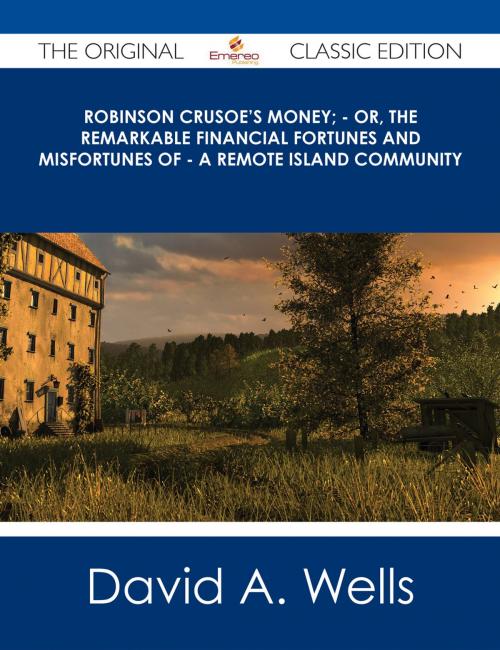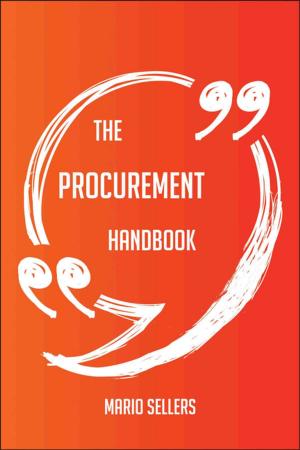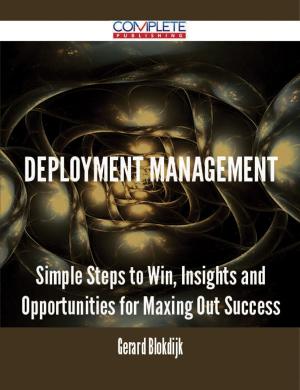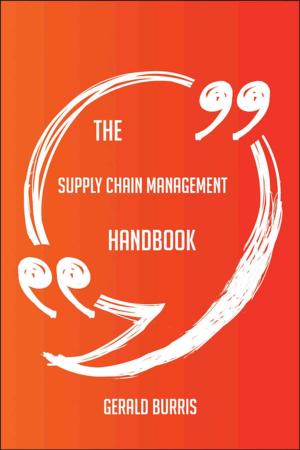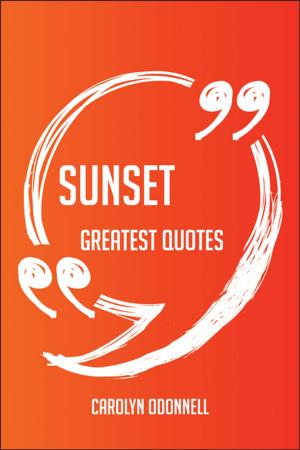Robinson Crusoe's Money; - or, The Remarkable Financial Fortunes and Misfortunes of - a Remote Island Community - The Original Classic Edition
Nonfiction, Reference & Language, Reference, Fiction & Literature| Author: | David A. Wells | ISBN: | 9781486447800 |
| Publisher: | Emereo Publishing | Publication: | March 18, 2013 |
| Imprint: | Emereo Publishing | Language: | English |
| Author: | David A. Wells |
| ISBN: | 9781486447800 |
| Publisher: | Emereo Publishing |
| Publication: | March 18, 2013 |
| Imprint: | Emereo Publishing |
| Language: | English |
Finally available, a high quality book of the original classic edition of Robinson Crusoe's Money; - or, The Remarkable Financial Fortunes and Misfortunes of - a Remote Island Community. It was previously published by other bona fide publishers, and is now, after many years, back in print.
This is a new and freshly published edition of this culturally important work by David A. Wells, which is now, at last, again available to you.
Get the PDF and EPUB NOW as well. Included in your purchase you have Robinson Crusoe's Money; - or, The Remarkable Financial Fortunes and Misfortunes of - a Remote Island Community in EPUB AND PDF format to read on any tablet, eReader, desktop, laptop or smartphone simultaneous - Get it NOW.
Enjoy this classic work today. These selected paragraphs distill the contents and give you a quick look inside Robinson Crusoe's Money; - or, The Remarkable Financial Fortunes and Misfortunes of - a Remote Island Community:
Look inside the book:
Under the guidance, therefore, as it were, of instinct (Robinson Crusoe encouraging), and without any enactment of law, Twist, Needum, Pecks, Diggs, Friday, Friday’s father, Will Atkins, and every body else, by common consent, agreed to select and 21adopt some single commodity which all should agree to take in exchange for whatever of products or services they might have to dispose of; so that whenever any one had any thing to exchange, he might first exchange it for this commodity, whatever it might be, and then with such intermediate object purchase at such times and places, and in such proportions as he might desire, whatever he might need. ...The people on the island, being uneducated, never did any such foolish thing; but when they came to study history, they found out, to their great surprise, that the people of other countries had repeatedly used things worthless in themselves as money; and many years afterward a man who aspired to be a great teacher even came to the island from the United States, and endeavored to convince the people that it was a great defect to use any thing as money which had any intrinsic value as a commodity.2 The 24children of the first school he attempted to talk to soon made his position embarrassing by reading from their histories that the people of every country, especially the poor and ill-informed, who had ever attempted to facilitate their exchanges by using something as money which had no intrinsic value, had in every case been so swindled and robbed, as a consequence, that sooner or later they were always compelled, as a measure of simple self-protection, to abandon its use, and in its place adopt something as money which had a generally acknowledged and comparatively permanent inherent value or purchasing power as a commodity. ...Thus, for example, it was objected to wheat, that, though it was almost always in demand, and represented a very constant amount of labor for its production, it was too bulky to carry about, and rarely had the same exact value one year as another; to cattle, that it was impossible to divide up an ox, cutting off the tail at one time and the ears at another, for the purpose of making change, without destroying the value of the animal as a whole; and that if cows in general were to be used as legal tender to pay debts, the very poorest cow would very probably be selected from the money-pen for such a purpose;5 while, if iron were adopted as money, and circulated 36at its current value, it might be necessary to move about a ton to pay a debt of twenty or thirty dollars.
About David A. Wells, the Author:
As commissioner of public works for New York City, Tweed led a ring that by 1870 had gained total control of the city's government, and controlled 'a working majority in the State Legislature'. ...One of his more famous cartoons, entitled 'Worse than Slavery,' showed a despondent black family holding their dead child as a schoolhouse is destroyed by arson, as two members of
Finally available, a high quality book of the original classic edition of Robinson Crusoe's Money; - or, The Remarkable Financial Fortunes and Misfortunes of - a Remote Island Community. It was previously published by other bona fide publishers, and is now, after many years, back in print.
This is a new and freshly published edition of this culturally important work by David A. Wells, which is now, at last, again available to you.
Get the PDF and EPUB NOW as well. Included in your purchase you have Robinson Crusoe's Money; - or, The Remarkable Financial Fortunes and Misfortunes of - a Remote Island Community in EPUB AND PDF format to read on any tablet, eReader, desktop, laptop or smartphone simultaneous - Get it NOW.
Enjoy this classic work today. These selected paragraphs distill the contents and give you a quick look inside Robinson Crusoe's Money; - or, The Remarkable Financial Fortunes and Misfortunes of - a Remote Island Community:
Look inside the book:
Under the guidance, therefore, as it were, of instinct (Robinson Crusoe encouraging), and without any enactment of law, Twist, Needum, Pecks, Diggs, Friday, Friday’s father, Will Atkins, and every body else, by common consent, agreed to select and 21adopt some single commodity which all should agree to take in exchange for whatever of products or services they might have to dispose of; so that whenever any one had any thing to exchange, he might first exchange it for this commodity, whatever it might be, and then with such intermediate object purchase at such times and places, and in such proportions as he might desire, whatever he might need. ...The people on the island, being uneducated, never did any such foolish thing; but when they came to study history, they found out, to their great surprise, that the people of other countries had repeatedly used things worthless in themselves as money; and many years afterward a man who aspired to be a great teacher even came to the island from the United States, and endeavored to convince the people that it was a great defect to use any thing as money which had any intrinsic value as a commodity.2 The 24children of the first school he attempted to talk to soon made his position embarrassing by reading from their histories that the people of every country, especially the poor and ill-informed, who had ever attempted to facilitate their exchanges by using something as money which had no intrinsic value, had in every case been so swindled and robbed, as a consequence, that sooner or later they were always compelled, as a measure of simple self-protection, to abandon its use, and in its place adopt something as money which had a generally acknowledged and comparatively permanent inherent value or purchasing power as a commodity. ...Thus, for example, it was objected to wheat, that, though it was almost always in demand, and represented a very constant amount of labor for its production, it was too bulky to carry about, and rarely had the same exact value one year as another; to cattle, that it was impossible to divide up an ox, cutting off the tail at one time and the ears at another, for the purpose of making change, without destroying the value of the animal as a whole; and that if cows in general were to be used as legal tender to pay debts, the very poorest cow would very probably be selected from the money-pen for such a purpose;5 while, if iron were adopted as money, and circulated 36at its current value, it might be necessary to move about a ton to pay a debt of twenty or thirty dollars.
About David A. Wells, the Author:
As commissioner of public works for New York City, Tweed led a ring that by 1870 had gained total control of the city's government, and controlled 'a working majority in the State Legislature'. ...One of his more famous cartoons, entitled 'Worse than Slavery,' showed a despondent black family holding their dead child as a schoolhouse is destroyed by arson, as two members of
